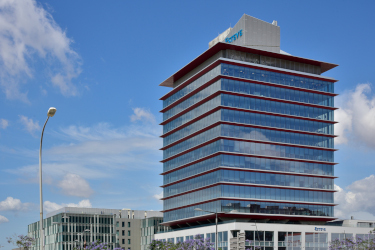02/04/2014
SYRIA AND THE PHILIPPINES ARE TWO DESTINATIONS OF ESTEVE’S AND FARMAMUNDI’S HEALTH CARE PROVISION IN HUMANITARIAN EMERGENCIES
More than 96,000 people benefit from ten health and food care interventions in eight countries thanks to Farmamundi's Humanitarian Aid Fund.
Farmamundi's Humanitarian and Emergency Aid Fund (FAHE), participated by ESTEVE, closes the year 2013 with 10 interventions that have benefited 96,168 people in 8 countries, particularly Syria and the Philippines. In addition, ESTEVE donated medicines that were distributed to hospitals, clinics, and maternal and child health centers in 21 countries.
The ongoing agreement for cooperation between ESTEVE and Farmamundi is put into practice in two different ways. On the one hand, a financial contribution made to Farmamundi's Humanitarian and Emergency Aid Fund (FAHE) allows immediate action to be taken in case of disasters and conflicts due to health-related chronic imbalances. On the other hand, medicines donated by ESTEVE are distributed by Farmamundi's Humanitarian and Logistics Area (ALH).
These donations have allowed four active substances supplied by ESTEVE (hydrocortisone, loperamide, miconazole, and mebendazole) to be distributed in the course of 37 expeditions to 21 countries. With the support of 33 organizations, these medicines have been distributed to hospitals, clinics, maternal and child health centers, shelters for sick people, orphanages and nursing homes in countries such as Ivory Coast, Ethiopia, Gambia, Guinea Bissau, Mozambique, El Salvador, Ecuador, and the Dominican Republic, among others. As Farmamundi's Logistic and Humanitarian Area responsible Antonio Bugeda points out, "these contributions are crucial and help reduce costs of our aid expeditions to the appropriate entities. More quality-assured medicines are now reaching more patients for a longer period of time."
In the year 2013, FAHE participated in three emergency or immediate action interventions, where 1,400 children under the age of 5 were treated and vaccinated against polio at the refugee camp of Dadaab, in the district of Fafi, in North West Kenya, upon WHO's health alert throughout the entire Horn of Africa on account of polio virus (WPV1) cases being detected in Kenya and Somalia. In Syria, basic food and healthcare needs are being addressed among displaced populations in Damascus and Homs. In the Philippines, emergency services and support to rebuild basic facilities have been provided.
Syria and the Philippines, primarily addressed in 2013
The festering conflict in Syria has already caused internal displacements of more than two million people, and some 5 million Syrians have sought refuge in neighboring countries such as Lebanon, Jordan and Turkey. Farmamundi has been involved in the supply of basic food products (sugar, rice, oil, pasta, lentils, packaged products, dried milk) and blankets to more than 4,000 displaced persons in five camps of Damascus and Homs, and to 1,400 families from Al Yarmouk, where some 18,000 people endure bomb attacks and violent clashes between the Syrian army and rebel groups.
"The humanitarian situation is now becoming seriously impaired by deeply deteriorated security conditions, escalating violence and lack of assistance to the civilian population. Also, very limited access to drinking water and basic food products, almost inexistent medical care due to the lack of medical staff, medicines, anesthetics, oxygen and other basic supplies, only worsen the situation", explains Farmamundi's chairman José Luis Daroqui, who urges international organizations to intervene. In addition, Farmamundi keeps calling for safe humanitarian corridors to allow action by NGOs and keep the critical situation endured by the population from further deteriorating. This situation still awaits a negotiated solution after the failure of the Geneva II international conference on Syria.
In the Philippines, the most compelling needs of the population affected by typhoon Yolanda in the Central Visayas Region have been addressed by displacing DYA and Farmamundi personnel to perform tasks of initial medical care and food supply, logistics, sanitation, and support to rebuild health facilities.
Fighting malnutrition in Mali's Niono Circle
Post-emergency interventions focused on fighting malnutrition among displaced populations and foster families in several locations of the Ségou Region (Mali), chiefly Diabali, Dogofri, Sokolo, Nampala and other neighboring cities (all located in the Niono Circle). "In addition to the political instability concerns in this country, the severe drought experienced over the last few years has ruined crops, killed herds of livestock, and induced water scarcity. At present, more than four and a half million Malians are at risk of food insecurity, thus making FAHE's support in the coming months indispensable", says Farmamundi's Humanitarian Action project responsible Carolina Raboso, who just returned from Mali.
In the Dominican Republic, interventions focused on enhancing the capacities of locals to prevent, mitigate and respond to disasters, and also on strengthening the local health system ―including medicine supplies to a Primary Care Unit, mobile one-day medical meetings, and local training on epidemic diseases, environmental sanitation, etc.
Finally, FAHE was also involved in three humanitarian interventions in Palestine, Uganda and the Democratic Republic of Congo. In Palestine, support was given to maternal and child health promotion in the city of Jenin and its refugee camp, as well as in the ancient village of Rummanah, where around 60,000 people received training on disease prevention, prenatal care, nutrition, and healthy habits.
In Uganda, support was provided to the Congolese refugee population by supplying medicines to five health centers in the district of Bundibugyo. Also, mosquito nets were distributed to families, shelter and hygiene supplies, as well as dried milk for children under the age of 5, were provided, and health promotion information sessions were held.
Also worth emphasizing is the improvement achieved in the sexual-reproductive and perinatal health care of displaced pigmy communities in the Democratic Republic of Congo, where Farmamundi has been working on a steady basis for more than 10 years. Specifically, health facilities have been improved with extensions, equipment and health personnel training, and support has also been provided by way of medicines essential to the sexual, reproductive and maternal health, with health care being provided during pregnancy and delivery. Also, strategies for the prevention of HIV-Aids transmission have been reinforced by raising community awareness and by supporting voluntary testing in the area.
You can follow ESTEVE on Twitter at this link: twitter.com/esteve_news.



